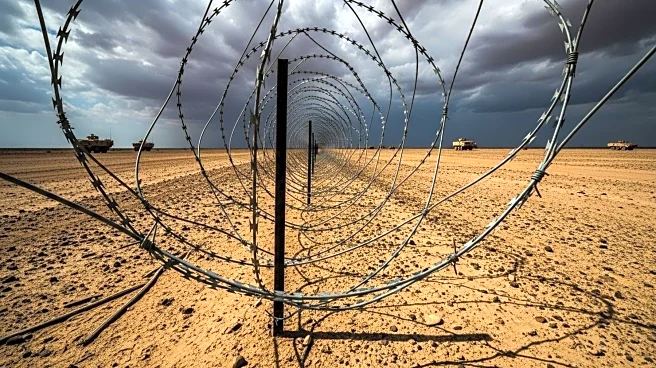What is the story about?
What's Happening?
The Syrian government has announced the arrest of a Hezbollah cell in the Damascus countryside, marking a significant development in the ongoing tensions between Syria's new leadership and the Iran-backed Lebanese group. According to Ahmad al-Dalati, head of internal security in rural Damascus, the operation was conducted by special forces in collaboration with the General Intelligence Directorate. The detainees were reportedly found in possession of rocket launchers, 19 Grad rockets, anti-tank missiles, small arms, and other ammunition. The suspects have been transferred for interrogation, and the case is now with judicial authorities. Hezbollah has denied any involvement, asserting that it has no presence or activities on Syrian soil and is committed to the stability and safety of Syria's citizens. This arrest is part of a broader effort by President Ahmad al-Sharaa's government to address what it perceives as threats to Syria's security, often described as remnants of the Assad regime.
Why It's Important?
The arrest of the Hezbollah cell underscores the complex geopolitical dynamics in the region, particularly the influence of Iran through its proxy, Hezbollah. Syria's actions reflect a shift in its internal security policy under the new leadership, which is attempting to distance itself from the Iranian-led Shiite axis that was prominent under the previous government. This move could have significant implications for regional stability, as it may alter the balance of power and alliances in the Middle East. The crackdown on Hezbollah-linked activities also highlights the ongoing struggle to control smuggling operations across the porous Syria-Lebanon border, which has been a conduit for arms and other illicit activities. The situation poses challenges for Lebanon, whose army is already stretched thin, and could impact broader regional security dynamics.
What's Next?
The Syrian government's actions may lead to increased tensions with Hezbollah and its backers, potentially prompting a response from Iran. The international community, particularly countries with vested interests in Middle Eastern stability, will likely monitor the situation closely. Further arrests or military actions could escalate the situation, affecting diplomatic relations and security strategies in the region. Additionally, the crackdown on smuggling operations may lead to increased border security measures by both Syrian and Lebanese authorities, potentially impacting local economies and communities reliant on cross-border trade.
Beyond the Headlines
The arrest of the Hezbollah cell may also have deeper implications for Syria's internal politics and its relationship with Iran. As Syria seeks to redefine its alliances and security policies, the move could signal a shift towards greater independence from Iranian influence. This development might also affect Hezbollah's operational capabilities and its strategic positioning in the region, potentially leading to a reevaluation of its tactics and alliances.

















